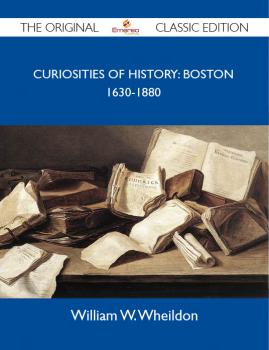Wheildon William
Список книг автора Wheildon WilliamCuriosities Of History: Boston 1630-1880 - The Original Classic Edition
The history of Boston plays a central role in the American history. In 1630, Puritan colonists from England founded the city, which quickly became the political, commercial, financial, religious, and educational center of the New England region. The American Revolution erupted in Boston, as the British retaliated harshly for the Boston Tea Party and the patriots fought back. They besieged the British in the city, with a famous battle at Bunker Hill and won the Siege of Boston, forcing the British to retreat. However, the British blockade of the port seriously damaged the economy, and the population fell by two thirds in the 1770s. The city recovered after 1800, becoming the transportation hub for the New England region with its network of railroads, and even more important, the intellectual, educational and medical center of the nation. <p> Along with New York, Boston was the financial center of the United States in the 19th century, and was especially important in funding railroads nationwide. In the Civil War era, it was the base for many anti-slavery activities. In the 19th century the city was dominated by an elite known as the Boston Brahmins. They faced the political challenge coming from waves of Catholic immigrants. The Irish Catholics, typified by the Kennedy Family, wrested the political control of the city by 1900. <p> This is a high quality book of the original classic edition. <p> This is a freshly published edition of this culturally important work, which is now, at last, again available to you. <p> Enjoy this classic work. These few paragraphs distill the contents and give you a quick look inside: <p> There were two large coves projecting into the peninsula,?one from the harbor and one from Charles River, nearly opposite to each other, and producing the narrow portion of the land already spoken of, so that if the peninsula was not formed of two islands originally, as has been supposed, the cutting of a creek across this narrow portion, nearly on the line of Blackstone Street, and uniting the waters of the two coves, had the effect practically to make it so, at least at such times as the waters of Charles River and the harbor met across the neck, near Roxbury; so that the peninsula can hardly be said to have been heart-shaped, much less square. <p> …In May following, this committee reported, that on the 31st of July, 1643, there was granted to Henry Simons, George Burden, John Hill, and their partners, all the cove on the north-west side of the causeway leading towards Charlestown, with all the salt marsh bordering thereupon, not formerly granted, on these conditions: that within three years they erect thereon one or more corn-mills, ?and maintain the same forever; also make a gate ten feet wide to open with the flood for the passage of boats into the cove,? &c. <p> …Converse, in 1631, was renewed Nov. 9, 1636, in form as follows: ?The Governor and treasurer, by order of the general court, did demise to Edward Converse the ferry between Boston and Charlestown, to have the sole transporting of passengers and cattle from one side to the other, for three years from the first day of the next month, for the yearly rent of forty pounds to be paid quarterly to the treasurer: Provided, that he see it be well attended and furnished with sufficient boats; and that so soon as may be in the next spring he set up a convenient house on Boston side, and keep a boat there as need shall require.
